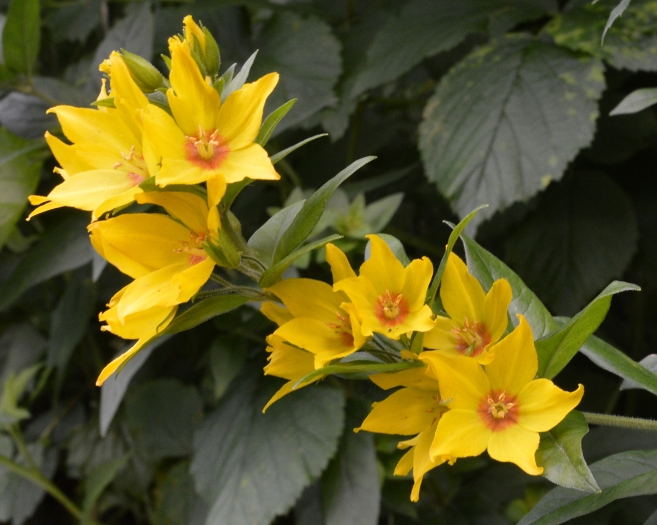Large Yellow Loosestrife
(Lysimachia punctata)
Large Yellow Loosestrife (Lysimachia punctata)
/
/

Ryan Hodnett
CC BY-SA 4.0
Image By:
Ryan Hodnett
Recorded By:
Copyright:
CC BY-SA 4.0
Copyright Notice:
Photo by: Ryan Hodnett | License Type: CC BY-SA 4.0 | License URL: http://creativecommons.org/licenses/by-sa/4.0/ | Rights Holder: Ryan Hodnett | Publisher: iNaturalist | Date Created: 2020-08-03T11:51:09-07:00 |



















































Estimated Native Range
Summary
Lysimachia punctata, commonly known as Large Yellow Loosestrife, is a perennial herb that may be evergreen or deciduous depending on the climate. It is native to open woodlands, stream banks, and meadows in Southern and Eastern Europe, the Caucasus, and Iran. This rhizomatous plant can reach up to 1.2 meters in height and is characterized by its upright, clump-forming habit. The showy yellow flowers, which bloom in late spring to early summer, have five petals, sepals, and stamens, and are clustered in the leaf axils, creating a striking display. The ovate leaves are arranged oppositely along the stems and are covered with fine hairs, as are the flower parts.
Large Yellow Loosestrife is valued for its bright, cheerful flowers and its ability to naturalize in suitable conditions. It is often used in border plantings, cottage gardens, and as a ground cover. It thrives in full sun to part shade and prefers moist, well-drained soil. While it is generally easy to maintain, it can spread aggressively via rhizomes, so gardeners should consider containment strategies. It is also important to be aware of its invasive potential outside its native range and to consult local guidelines before planting.CC BY-SA 4.0
Large Yellow Loosestrife is valued for its bright, cheerful flowers and its ability to naturalize in suitable conditions. It is often used in border plantings, cottage gardens, and as a ground cover. It thrives in full sun to part shade and prefers moist, well-drained soil. While it is generally easy to maintain, it can spread aggressively via rhizomes, so gardeners should consider containment strategies. It is also important to be aware of its invasive potential outside its native range and to consult local guidelines before planting.CC BY-SA 4.0
Plant Description
- Plant Type: Herb
- Height: 2-3 feet
- Width: 1-1.5 feet
- Growth Rate: Moderate
- Flower Color: Yellow
- Flowering Season: Summer
- Leaf Retention: Deciduous
Growth Requirements
- Sun: Full Sun, Part Shade
- Water: Medium, High
- Drainage: Slow, Medium
Common Uses
Bee Garden, Bird Garden, Border Plant, Butterfly Garden, Deer Resistant, Groundcover, Hummingbird Garden, Potted Plant, Rabbit Resistant, Salt Tolerant, Showy Flowers, Water Garden
Natural Habitat
Native to open woodlands, stream banks, and meadows in Southern and Eastern Europe, the Caucasus, and Iran
Other Names
Common Names: Dotted Loosestrife, Circle Flower, Spotted Loosestrife, Dotted Loosestrife, Large Loosestrife, Spotted Garden Loosestrife, Spotted Yellow Loosestrife, Punktierter Gilbweiderich, Goldfelberich, Lysimaque Ponctuée
Scientific Names: , Lysimachia punctata, Lysimachia punctata var. verticillata,
GBIF Accepted Name: Lysimachia punctata L.